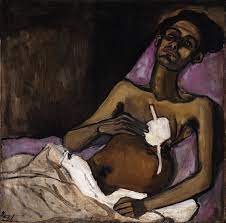J. Hoberman at The Point:
 Neel was, to use a much-abused word, a humanist—and not only because she was a figurative painter. Unlike ponderously performative portraitists like Francis Bacon and Lucian Freud, Neel did not objectify her subjects. She looked at them, and very often, they stared back at her. You might call her portraits a frank exchange of views. The gray-eyed woman who is the subject of “Elenka” (1936) could perform laser surgery with the intensity of her gaze. The expression on the face of Neel’s dying mother, bundled in a flannel robe, shrinking back and propped in a chair for “Last Sickness” (1953), is a lacerating blend of fear, reproach and shame. One of the two kids portrayed in “The Black Boys” (1967) is resigned, whereas the other, staring straight at the viewer, makes a challenge of his boredom.
Neel was, to use a much-abused word, a humanist—and not only because she was a figurative painter. Unlike ponderously performative portraitists like Francis Bacon and Lucian Freud, Neel did not objectify her subjects. She looked at them, and very often, they stared back at her. You might call her portraits a frank exchange of views. The gray-eyed woman who is the subject of “Elenka” (1936) could perform laser surgery with the intensity of her gaze. The expression on the face of Neel’s dying mother, bundled in a flannel robe, shrinking back and propped in a chair for “Last Sickness” (1953), is a lacerating blend of fear, reproach and shame. One of the two kids portrayed in “The Black Boys” (1967) is resigned, whereas the other, staring straight at the viewer, makes a challenge of his boredom.
Nearly four decades after her death, Neel reappears as an avatar of art-world diversity. If in 1974, she was hailed as a feminist (another term she uneasily accepted), she now is a woman who shucked off her white middle-class privilege.
more here.
